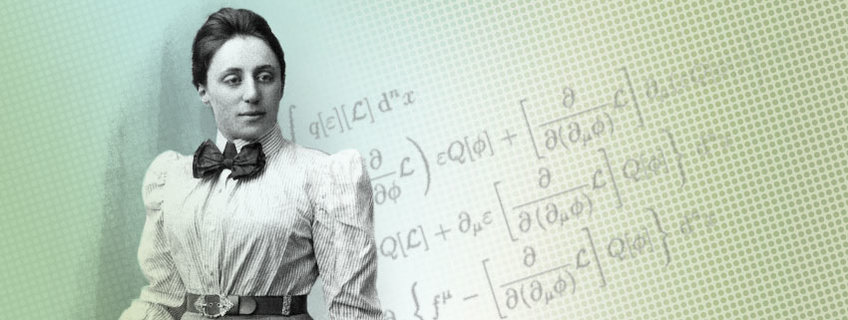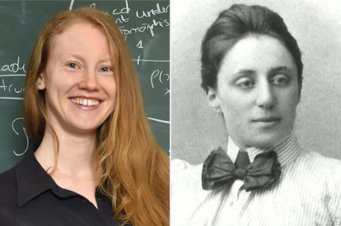
"Without Emmy Noether, there would be a huge gap in mathematics and its understanding"
Noémie Combe, Max Planck Institute for the Mathematics of Sciences, about the brilliant mathematician Emmy Noether, regarded as the inventor of modern algebra

Emmy Noether (1882-1935), one of the most important female scientists of the 20th century, women in science and early learned gender stereotypes.
She transcended the boundaries of traditional thinking in mathematics and changed the face of abstract algebra forever: the mathematician Emmy Noether (1882-1935) is considered one of the most important female scientists of the 20th century. Noether's rings and modues are named after her, and Noether's normalization theorem and Noether's theorem also bear her name. In this theorem, or first theorem, she stated in 1915 "that every differentiable symmetry of the action of a physical system has a corresponding conservation law" - still a fundamental basis of theoretical physics today.
The body of her groundbreaking work can be categorised into three time different periods. In the first, from 1907 to 1919, she made fundamental contributions to number fields and algebraic invariants. This period also includes her pivotal work in physics, her two Noether's theorems. In the second era of her work (between 1920 and 1926), she focused on abstract algebra and her theory of mathematical rings. In the final period from 1927-1935, Noether tackled noncommutative algebras and hypercomplex numbers.
Although Noether developed an international reputation as an exceptionally brilliant mathematician during her lifetime, she faced countless obstacles in her career, not least the combined barriers of sexism and antisemitism. Much of her work remained largely unpaid, most of her positions unofficial.
She was born Amalie Emmy Noether on March 23, 1882 in Erlangen, where her father, Max was a professor of mathematics. She initially wanted to teach English and French, but chose to pursue the subject of mathematics instead. As women were not allowed to matriculate at German universities at the time, she was only able to audit classes when she began her studies at the University of Erlangen in 1900. When the rules on women’s participation were changed, she earned her doctorate in mathematics ‘summa cum laude’ in 1907, as only the second woman to obtain a Ph.D. in mathematics from a German university. For the next seven years, Noether taught in Erlangen, without pay or title, before being invited to teach at the University of Göttingen by David Hilbert, one of the most famous mathematicians of his time.
However, the opposition to female academics was so strong that Noether was only allowed to lecture under Hilbert's name and did not receive her permission to lecture until 1919. In 1922, she became an "associate professor without tenure" and began to receive a modest compensation for her teaching. After the rise of the Nazis to power in Germany in 1933, Emmy Noether was expelled from her university and emigrated to the U.S.A., where she taught at Bryn Mawr College until her untimely death in 1935.
What is it about Emmy Noether particularly fascinates you?
Her determination, courage and incredible mental power. Her unbelievable strength to do the opposite of what society expected from her. Her inner strength to follow her passion for mathematics a time when women were still considered intellectually inferior to men. Also, an incredible ability for concentration, which enabled her to make great discoveries. Last but not least, her confidence in her own capabilities.
What made you become a scientist? What piqued your interest in mathematics?
I have an urge to understand in a Cartesian and logical way why, what and how things happen. On the other hand, I have a lot of imagination, which I have a desire to express in some way. Mathematics is perfect for that.
How relevant is Noether’s work today?
Immense! Without Noether’s work, the current algebraic geometry branch wouldn’t be what it is; the theory of invariants would not exist; fundaments of algebra (for example Noetherian rings) would not exist. She is one of the pioneers of modern algebra. Without Noether’s work there would be a huge gap in mathematics and its understanding.
There are many different branches of maths, on which Noether's work had a considerable impact - far too many too mention here.
I would like to give just a few examples: Noether took her own original mathematical path in 1920, the beginning of her general theory of ideals period. The considerable development of fundamental abstract algebra was possible due to two major papers of Noether, from 1919 and 1920. She is particularly famous for her Noetherian rings.
In 1932, at the International Congress of mathematics (Zurich), Noether presented a summary of her impressive research program, showing the strong relationship between hypercomplex systems, commutative algebra and number theory. The important idea Noether developed there was the applicability of non-commutative algebra, i.e. simple central algebra, to commutative algebra.
She introduced a Galois theory of non-commutative rings: an analogy of the Galois theory of fields, and the key idea to obtain the formulation for general Galois fields was to use the hypercomplex method.
Noether also proved a theorem that contributed to physics, which states that a dynamical system described by an action invariant under a Lie group with n parameters admits n invariants that remain constant, in time, during the evolution of the system. This theorem can be applied to quantum theory and to Einstein’s relativity theory. All these research programmes are still very active today.
How did Noether succeed in forging her own path, despite the restrictions placed upon women in science and in society in general in that era?
She had a great strength of character. Her life would have been much easier if she had chosen a conventional lifestyle, but she chose not to.
She had such great talent and mathematical insights that she pursued her brilliant ideas despite encountering prejudice based on her gender, which led her to unravel hidden paths in the castle of mathematical ideas.
The proportion of female scientists worldwide is only 30 percent. The underrepresentation of women in science is still pervasive today, especially in the STEM subjects (mathematics, engineering, natural and technical sciences). What factors do you think contribute to this discrepancy?
Unfortunately, persistent cultural biases and gender stereotypes have existed for many centuries. Nowadays, progress has been made. The situation is certainly better than in the times of Sonja Kovalevskaia and Marie Curie, where institutional sexism was the norm and women were called bird names every time they entered the university, because they dared to study science.
However, I am afraid that negative stereotypes and biased opinions are still deeply embedded within in our society, starting already at a very young age. Making the choice of being a scientist, for a woman, is still not an easy one.
STEM professions are still dominated by men. In your opinion, what needs to happen so that more girls are inspired by STEM subjects, and so that more women go on to careers in STEM fields?
As I am European, my perspective is here from a European standpoint. Stereotypes are deeply rooted in our society and manifest themselves at a very young age.
For example, I remember that when I was three years old, in kindergarten, there was a moment in the day where we were free to pick any toy from the toy box and play any game we wanted.
There was a box full of women’s clothes, children’s modelling material, some microphones with a recording system for singing, legos, and an ironing board along with a broken steam iron, etc.
There was a small group of girls who spent their entire game session rigorously ironing and sweeping the floor. One day, my mum visited, and asked me: “Why don’t you ever play with the legos?” My answer was: “That’s for the boys”. So at that young age the information had been already transmitted to me that there are many games that are “only for the boys”, where girls are not welcome. And often these beliefs unfortunately continue when children grow up into being adults.
It is certainly not easy to overcome stereotyping, which also comes with strong social pressure. Unfortunately, these ideas are very persistent and ‘stick’ in our heads. No one likes to be ridiculed or feel rejected. You have to be mentally very strong, and independent to be able to overcome such obstacles.
That is why we should fight to get those false ideas. Every girl should have the possibility to study science if that’s she wants to do.
Do you think we need a structural change in science and academia to increase the proportion of women?
Yes, I believe that structural change in science and academia is necessary. A greater contractual job security for young scientists, for example, would be very important.
Short contracts look good on the paper, but are bad in reality. Firstly, of all this means endless, stressful applications.
Finally, when you have managed to obtain a short-term contract somewhere, this often means starting a new life (no friends, probably no relatives, etc.) and no reliable plans for the future (career-wise and familywise).
In your opinion, do you think mentoring programs and/ or women's networks are useful measures? Are there any offers (programs, networks etc.) to overcome hurdles for women in science that you found helpful in your own experience?
Again, I can only give a European perspective here. I think that it’s important to encourage any young woman who wants to pursue mathematical, physics and technological subjects and who has interesting scientific ideas.
Contrarily to popular belief, I don’t think that talent for mathematics (and for science in general) among women is particularly rare. I have mentored many training courses for high school pupils, and noticed that in a small group of 5-6 people there was always one girl eager to do the maths exercises for all the others.
Regrettably, none of these girls chose to study maths at university. When I happened to run into some of these girl after they finished school, they had chosen subjects that seemed more “fitting” for girls. But quite honestly, they did not look as happy as they did during the math training course.
I recently watched a TV program where a journalist said that women were not good at science, particularly mathematics, because they were not capable of concentration. I find such negative stereotypes about women’s math abilities not only offensive, I think they undermine the interest of girls in STEM subjects.
There are many women with a talent for maths and science. Their work, however, is often underestimated. Often, their maths/ science questions are considered as stupid. In the end, all those girls who persevered in this hostile environment are presented as marginal. But many women just give up and bury their dreams of a science career in the face of this type of pressure.
To conclude, I certainly think that mentoring programs are helpful. But there is still a great deal of progress to be done.
What advice would you give to young women considering a career in science?
Trust your inner self! You are the only one who knows what you want.












